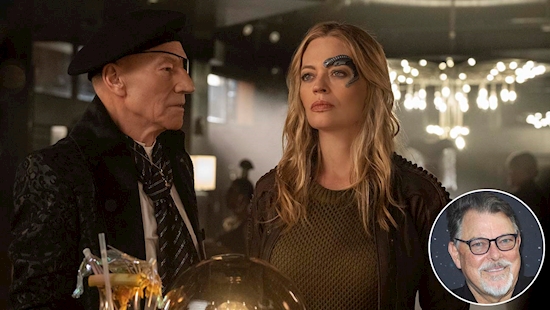How 'Star Trek: Picard' Director Jonathan Frakes Crafted That Surprising Scene
[This story contains spoilers for Star Trek: Picard, season one, episode five]
It's fitting that Jonathan Frakes directed this week's Star Trek: Picard episode, which marks the first significant on-screen encounter between Star Trek's most popular former Borgs: Jean-Luc Picard (Patrick Stewart) and Seven of Nine (Jeri Ryan).
Frakes, who directed "Stardust City Rag," also helmed Star Trek: First Contact — the hit 1996 feature film that further explored the aftermath of Picard's assimilation into Locutus of Borg, the alien race's spokesman for their first attempt to add humanity to their collective. But his reunion tour with the Borg wasn't planned.
"It was completely the luck of the draw," Frakes tells The Hollywood Reporter. "But I was grateful to be apart of reintroducing fans to Seven, particularly their mini-scene — where these two former Borgs — they exchange their baggage and their feelings about having been ‘Borg-ified.' It's one of my favorite scenes I've ever done."
It's also one of the most compelling and dramatic scenes Star Trek has ever done. Like First Contact before it, this scene, toward the end of the episode, gives the director another chance to not only force Picard to confront the darkest chapter of his past, but to reveal for the first time how that scar never fully healed. We learn that, even though it has been 30 years since Picard was assimilated, he — like Seven — did not come out of that with all his humanity intact. Some of it is missing, and, after three decades, he's still trying to find it. The import of such a scene, especially one between two of Trek's most popular actors and characters, wasn't lost on Frakes. If for no other reason other than the scene represents a sharp contrast to the more "homogenized" way his series, Star Trek: The Next Generation, handled such drama.
"We never could have done [a scene like] this on our show," Frakes explains. Why? Gene Roddenberry. The creator of Star Trek believed that, in TNG's 24th Century, there would be no conflict amongst "the family, the crew of the Enterprise," and therefore no drama or emotional catharsis on the level Picard displays here. The actor-director, who will reprise the role of Riker, Picard's former first officer, on Picard, credits both the episode's writer, Kirsten Beyer, and showrunner and executive producer Michael Chabon for allowing the characters to be pushed to such vulnerable places that TNG couldn't do.
"The scene was mostly worked out with the help of Michael Chabon and our wonderful writers and new additions to the Star Trek family: Akiva Goldsman, Alex Kurtzman, Kirsten Beyers. It's such a simple and beautifully-performed scene between the two actors," says Frakes.
Not so simple was Jeri Ryan's initial return to the role of Seven, especially for this demanding scene.
"Jeri was struggling with finding the quote-unquote voice of Seven. In that she felt that the current version of her character, almost 20 years later, it was challenging to get a bead on what has happened to [Seven] in the passage of time? Is there a world in which Seven could or could not find who she was?" says Frakes. "And Chabon explained what he felt was going on, and Jeri explained what she felt might be missing and might have resonated through these last 20 years, and they came to this [middle ground] on where Seven is. Who, on the Picard show, is a character that — you got to give credit to Jeri, playing her older and wiser. She is definitely better than she was on Voyager. It's great to have her back."
Another heartbreaking moment in this episode — which, don't worry, has one hell of a phaser battle in it, too — is the scene between Raffi (Michelle Hurd) and Gabriel, her estranged son on Freecloud. To have two scenes in one episode was "refreshing" for the Trek veteran.
"As we know, conflict is what creates drama. So, on Next Gen, it was a very challenging set of rules — primarily for the writers — to find ways to create drama. In this new version of Star Trek, which honors what Roddenberry laid out — in terms of the optimism and respect toward themes like racism — all of those elements are sort of strongly rooted in this show," says Frakes. "But the notion of self-doubt, the vulnerability — especially for a [character] like Picard — the damage of past experiences, are so much more compelling to watch … It's a denser show than Next Gen, I think that's fair to say. Pushing Picard to these places, watching Patrick act that out -- and he was in the writer's room as they developed this story — it's all so rewarding to see."
New episodes of Star Trek: Picard air Thursdays on CBS All Access.
This media is not available on this platform.
Source: www.hollywoodreporter.com

